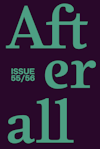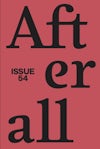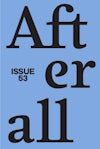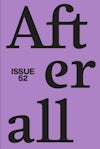
Issue 12
Autumn/Winter 2005
Editors: Charles Esche, Thomas Lawson, Mark Lewis, Pablo Lafuente, Silke Otto-Knapp.
Founding editors: Charles Esche, Mark Lewis.
Table of contents
Foreword
Contextual Essays
- A Victim and a Viewer: Some Thoughts on Anticipated Ruins – Magali Arriola
- Why Are Conceptual Artists Painting Again? Because They Think It’s a Good Idea – Jan Verwoert
Artists
Patrick Caulfield
- Waiting, Thinking, Drinking: A Conversation about Patrick Caulfield’s Interiors – Thomas Lawson & Katherine Lewis
- Patrick Caulfield – Michael Bracewell
T.J. Wilcox
- T. J. Wilcox – Kirsty Bell
- T.J. Wilcox: From Dusk till Dawn – Bettina Funcke
Cathy Wilkes
- Today – Polly Staple
- Ten Concepts Following Cathy Wilkes’s Practice – Simon O’Sullivan
- Boris Mikhailov The Ethics of a View: Notes on Boris Mikhailov – Viktor Misiano
- Toward an Empathic Resistance: Boris Mikhailov’s Embodied Documents – Walead Beshty
Trisha Donnelly
- Her Artillery – Bruce Hainley
Foreword
Written by Thomas Lawson
This issue was conceived over the course of several wintery days in late January at the Van Abbemuseum in Eindhoven. The editorial group had convened there for our usual contentious debate about contemporary art and its relevance to a larger society…
This issue was conceived over the course of several wintery days in late January at the Van Abbemuseum in Eindhoven. The editorial group had convened there for our usual contentious debate about contemporary art and its relevance to a larger society. After many artists had been proposed and dismissed it began to become clear to us that, if not yet agreeing, we were at least circling around something, a question really: ‘What, now, did we make of the idea of the lonely artist, struggling with big undefinables such as “meaning” and “authenticity”?’ Central to what remained an undefined idea stood the strangely solitary figure of Patrick Caulfield.
As it happens I had been trying to interest my colleagues in Caulfield’s work for a couple of years since having encountered his stunning After Lunch in a gallery at Tate Modern, during what was beginning to seem a forever tour through that dull fog of earth-toned still lifes that make up the British version of modernism. I still remember the grey light from the Thames illuminating rooms of frying pans and sausages, from Braque to Polke. Then came the gloomy restaurant murals that Rothko painted for the Four Seasons in Mies’s Seagram Building, that dark symphony in maroon and black. After this the sensuous uplift of the encounter with Caulfield’s frank embrace of Matisse came as welcome tonic. And so clever – he wrought his critique of the legacy of cubism while happily sticking to those old reliables, food and drink.
But Caulfield shows us an empty restaurant, there is no food on the table. Instead the machinery of the painting takes us elsewhere, anywhere but the dreary present. His is an art of solitary longing, a search for meaning in individual endeavour. This kind of Romanticism, framed by a deep knowledge of history and a recognition of limits, became the hook on which we could hang an issue. With that in place we soon identified the wistful searches for continuity and narrative fidelity in T.J. Wilcox’s ever-growing collection of short films. Then came the multi-layered installations of Cathy Wilkes, with their invocations of many histories, personal and public. After some further discussion we agreed that Trisha Donnelly’s melancholy attempts to tell tales in both installations and performances made a perfect foil. We then rounded out the issue with the work of Boris Mikhailov, whose photographs come at the problem of truth and meaning from the other side, from the outside in.
Purchase
The publication is available for purchase. If you would like specific articles only, it is also available individually and to be downloaded as PDFs.
Purchase full publication
Buy via University of Chicago Press
Buy via Central Books
Purchase individual articles
Buy via University of Chicago Press



